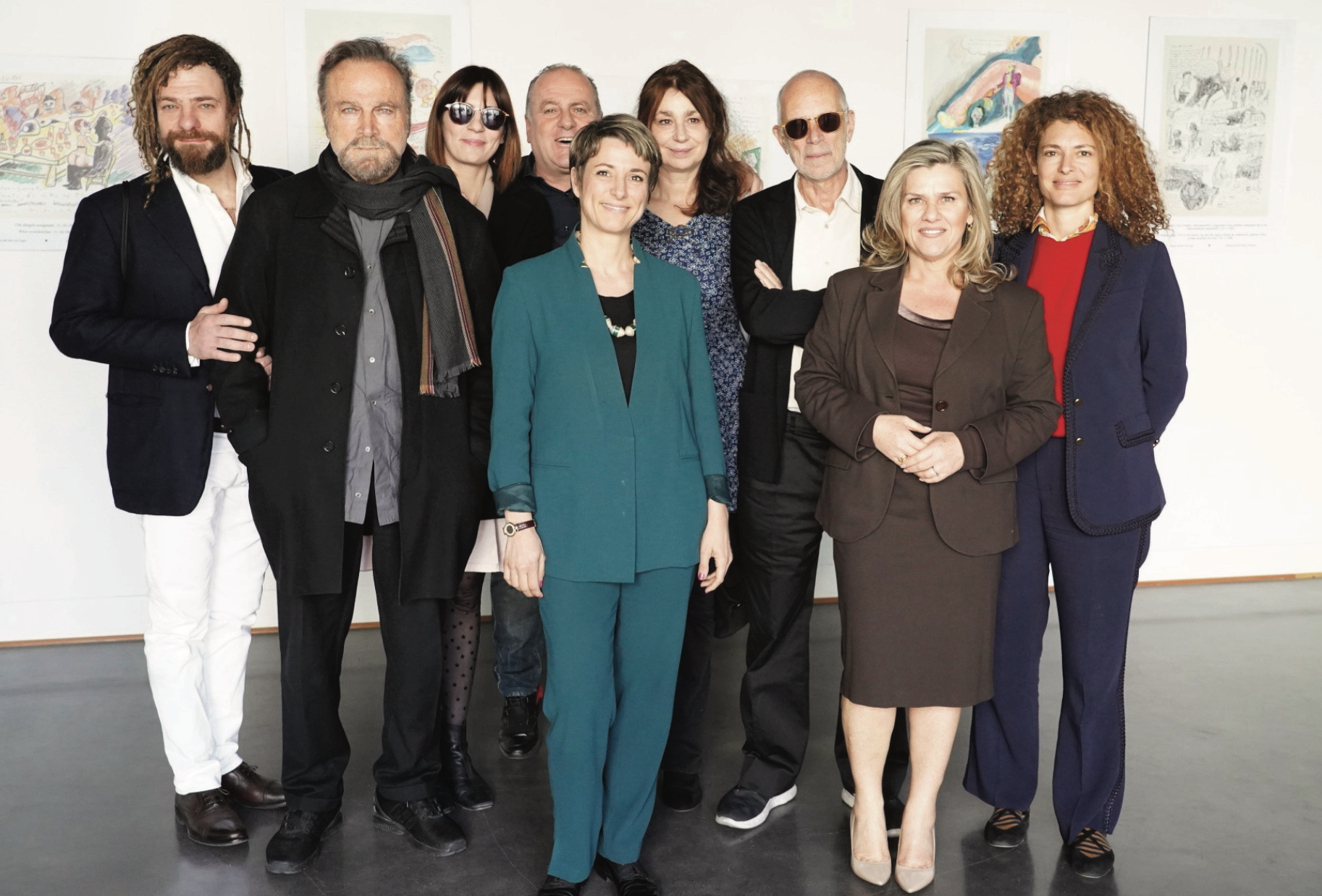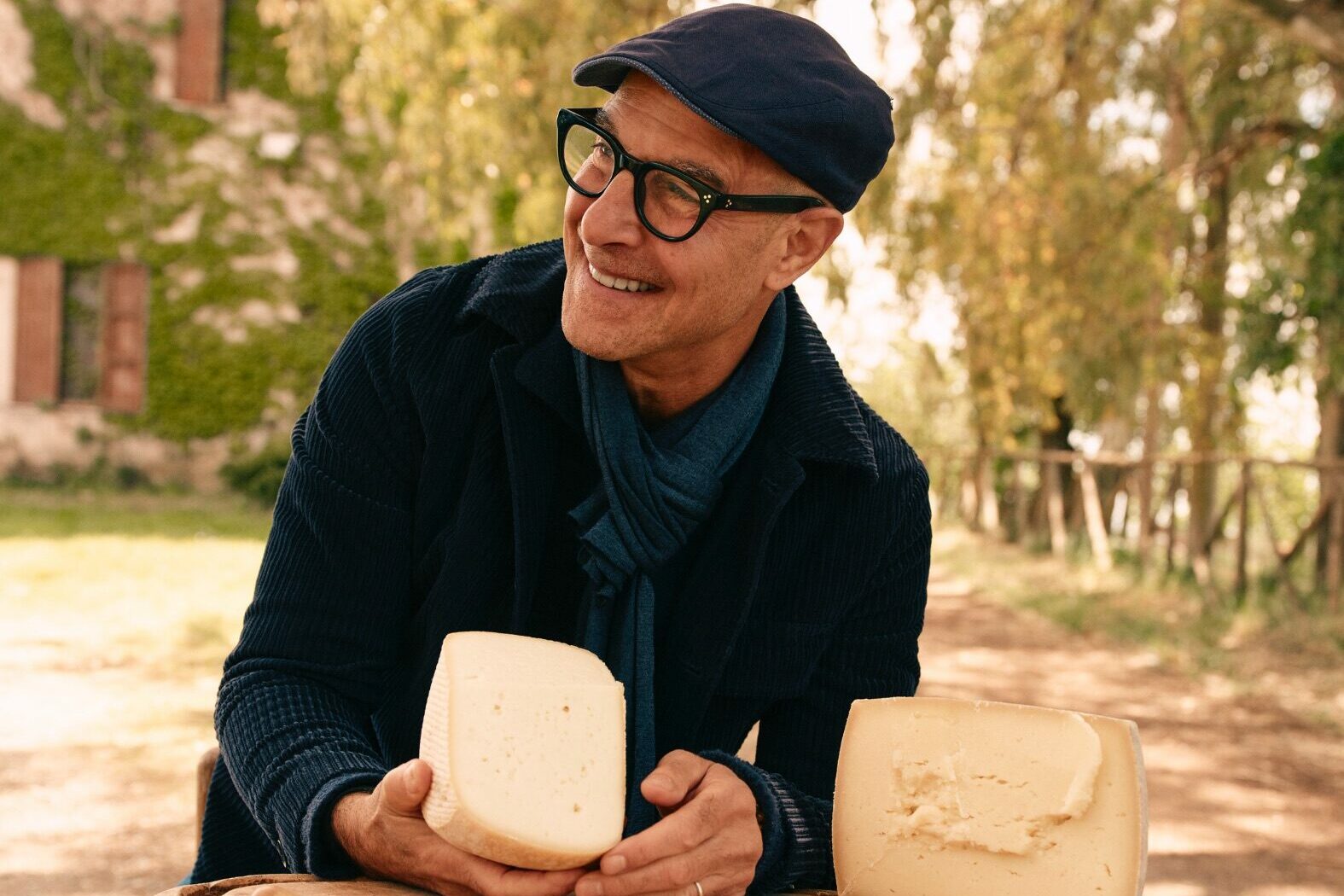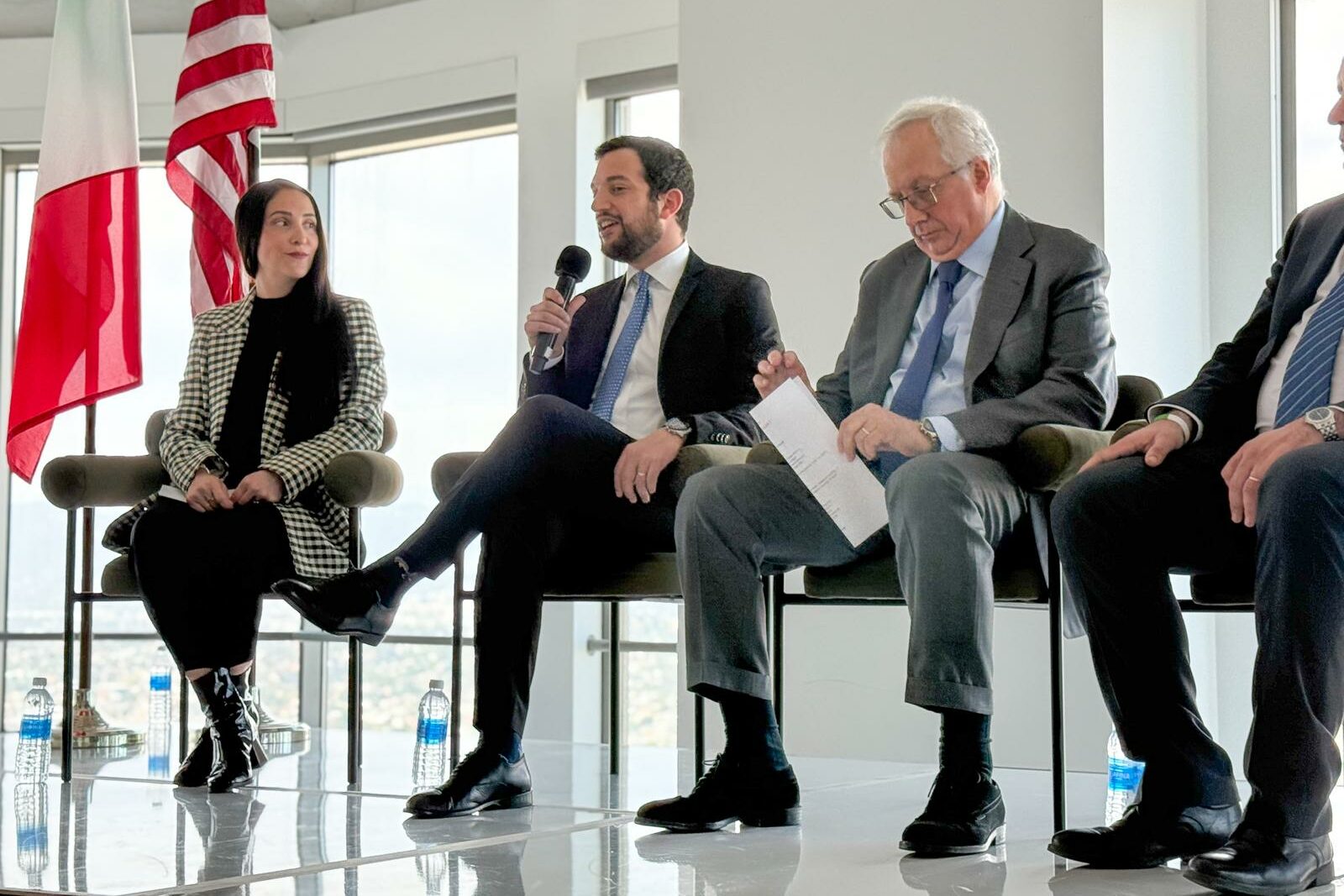“Gabriele Salvatores is the ideal artist to preside over the current edition of this festival. His love for our country, his support and his important contribution to our culture knows no boundaries.” With these words, blue-eyed and well-built Italian actor
Franco Nero, introduced Italian Academy Award-winning film director and screenwriter, Gabriele Salvatores, during an event held at the Italian Cultural Institute in Westwood.
Oscar-winning director for Mediterraneo, Salvatores was selected by the Capri Institute in the World as president of the 15th edition of Los Angeles, Italy – Film, Fashion and Art Fest, which this year took place from 2nd to 8th of February at the Chinese Theater in Hollywood. The event opened in Hollywood, as it traditionally happens every year, right before the Oscars, with a parterre of famous Italian and Italian-American artists and a rich program of previews, retrospectives and exhibitions that focused on the cinema and culture of our country.
In 1991, Salvatores received international praise for Mediterraneo, which beside winning an Academy Award as best foreign film, also won three David di Donatello, the most important award for Italian cinema, and a Silver Ribbon.
Gabriele Salvatores began his career as a theater director in 1972, founding the Teatro dell’Elfo in Milan, where he remained active until 1989, the year in which he made his film debut with the road movie Marrakech Express. After this first success, he directed Turné, presented in 1990 at the Cannes festival, and Mediterraneo (1991), which won the Oscar for Best Foreign Language Film as well as three David di Donatello awards.
Gabriele, how does it feel to be the president of a festival that celebrates Italian cinema in the city of cinema?
It feels normal! (laughs) And also I have to admit I haven’t really understood what being the president of this festival means, I get introduced and say hello to many people, I give out awards, and that’s it! It’s pretty easy! On the other hand I think it is an honor to be asked to have this role and I thank Pascal Vicedomini for having me here.
So you came back to Los Angeles after many many years, what’s your impression?
I have to admit I don’t know this city very well, and it’s not my favorite city in America. It doens’t have a city center and since I am someone who needs to feel secure, the vastity of LA makes me feel a bit lost. But it has changed a lot since the last time I came here which was ten years ago, when I came to take part to the same festival with my movie Happy Family.
How would you describe Los Angeles, the city of movies and stars?
I would say say it’s almost like a puzzle and you can make it up the way you want it to be.
What do you do here in your free time?
Beside all my appointments, my friend Marco knows the city very well and he takes me to the best places. He took me to Malibu, Santa Monica, Venice Beach.
You once turned down an offer to work in Hollywood, is it something you would reconsider now?
No, I am happy I said no. It was 1992, I had just won an Oscar, and since it was only my third movie I still needed to know what kind of cinema I wanted to do. Here you have to do their kind of movies. And also, I had just fell in love with an Italian woman and she didn’t want to leave Italy.
So you said no for love?
Yes, also for love.
Have you been back to the Dolby Theater where you won the Oscar?
No, I haven’t! I am so busy but of course it came to mind as soon as I stepped foot here. It was my third movie and honestly I didn’t even think I deserved an Oscar so I was not expecting to win. I was very lucky and it definitely gave a new direction to my life.
In Italy you have always been a trailblazer in terms of special effects, for example in your movie The Invisible Boy. In your opinion what does Italian cinema need today?
It needs a little bit of confidence because it is way better that what it looks from the outside. As you mentioned with my movie I experimented a lot with visual effects, directing, acting… We have very high standards. Maybe what we lack is the ability to write good stories, we should learn to write movies that can be internationally appreciated, and not movies that can be enjoyed and understood by us Italians only. On the other hand, I think we shouldn’t loose our roots or sell our soul to the Devil, therefore it is hard to find a balance. So I would definitely say that we need more confidence and more support from our government.
Your movie All My Crazy Love portrays a father and son, their incredible adventure on the road while traveling from Eastern Italy to the deserted streets of the Balkans, and their affectionate, amusing, problematic and unusual relationship. Is it true you were supposed to shoot it here in California?
Yes, the original story was based here, between Los Angeles, New York and Mexico, but it was hard for me to think about the desert without thinking about all the movies shot here, filled with that kind of images. So I tried to find another place, a new one, and I went east, to Croatia. I am happy I chose it as it is fresh and relatively unknown on the screen.
What’s your next project?
My next project is about Casanova so it’s a love story, actually a double love story.
“Gabriele Salvatores è l’artista ideale per presiedere l’attuale edizione di questo festival. Il suo amore per il nostro Paese, il suo sostegno e il suo importante contributo alla nostra cultura non conosce confini”. Con queste parole, l’attore italiano aitante e dagli occhi azzurri Franco Nero, ha presentato il regista e sceneggiatore premio Oscar Gabriele Salvatores, durante un evento tenutosi presso l’Istituto Italiano di Cultura a Westwood.
Il regista Salvatores, premio Oscar per Mediterraneo, è stato selezionato dall’Istituto Capri nel Mondo come presidente della 15° edizione del Los Angeles Film, Fashion and Art Fest, che quest’anno si è svolto dal 2 all’8 febbraio al Chinese Theater di Hollywood. L’evento si è tenuto a Hollywood, come accade tradizionalmente ogni anno, proprio prima degli Oscar, con un parterre di famosi artisti italiani e italo-americani e un ricco programma di anteprime, retrospettive e mostre incentrate sul cinema e la cultura del nostro Paese.
Nel 1991, Salvatores ha ricevuto il plauso internazionale per Mediterraneo che, oltre a vincere un Academy Award come miglior film straniero, ha vinto anche tre David di Donatello, il più importante riconoscimento per il cinema italiano, e un Nastro d’Argento.
Gabriele Salvatores ha iniziato la sua carriera come regista teatrale nel 1972, fondando il Teatro dell’Elfo di Milano, dove è rimasto attivo fino al 1989, anno del suo debutto cinematografico con il road movie Marrakech Express. Dopo questo primo successo, ha diretto Turné, presentato nel 1990 al festival di Cannes, e Mediterraneo (1991), che ha vinto l’Oscar per il miglior film straniero e tre David di Donatello.
Gabriele, come ci si sente ad essere il presidente di un festival che celebra il cinema italiano nella città del cinema?
Ci si sente normali! (ride) E poi devo ammettere che non ho capito bene cosa significhi essere il presidente di questo festival, mi presento e saluto molte persone, distribuisco premi, e questo è tutto! È abbastanza facile! D’altra parte penso che sia un onore essere chiamato a ricoprire questo ruolo e ringrazio Pascal Vicedomini per avermi ospitato.
E’ tornato a Los Angeles dopo tanti anni, che impressione ha?
Devo ammettere che non conosco molto bene questa città, e non è la mia città preferita in America. Non ha un centro città e siccome sono una persona che ha bisogno di sentirsi sicura, la vastità di Los Angeles mi fa sentire un po’ perso. Ma è cambiata molto dall’ultima volta che sono venuto qui, dieci anni fa, quando sono venuto per partecipare allo stesso festival con il mio film Happy Family.
Come descriverebbe Los Angeles, la città del cinema e delle star?
Direi che è come un puzzle e che puoi inventarla come vuoi.
Cosa fa qui nel tempo libero?
Oltre a tutti i miei appuntamenti, il mio amico Marco conosce molto bene la città e mi porta nei posti migliori. Mi ha portato a Malibu, Santa Monica, Venice Beach.
Una volta ha rifiutato un’offerta di lavoro a Hollywood, è qualcosa che riconsidererebbe ora?
No, sono felice di aver detto di no. Era il 1992, avevo appena vinto un Oscar, e siccome era solo il mio terzo film avevo ancora bisogno di sapere che tipo di cinema volevo fare. Qui bisogna fare il loro tipo di film. E poi, mi ero appena innamorato di una donna italiana e lei non voleva lasciare l’Italia.
Quindi ha detto di no per amore?
Sì, anche per amore.
È tornato al Dolby Theater dove ha vinto l’Oscar?
No, non ci sono tornato! Sono molto occupato, ma naturalmente mi è venuto in mente appena ho rimesso piede qui. Era il mio terzo film e sinceramente non pensavo nemmeno di meritare un Oscar, quindi non mi aspettavo di vincere. Sono stato molto fortunato e ha sicuramente dato una nuova direzione alla mia vita.
In Italia è sempre stato un pioniere in fatto di effetti speciali, ad esempio nel film The Invisible Boy. Secondo lei di cosa ha bisogno oggi il cinema italiano?
Ha bisogno di un po’ di fiducia, perché è molto meglio di quello che sembra dall’esterno. Come ha detto lei, con il mio film ho sperimentato molto gli effetti visivi, la regia, la recitazione… Abbiamo standard molto elevati. Forse quello che ci manca è la capacità di scrivere buone storie, dovremmo imparare a scrivere film che possano essere apprezzati a livello internazionale, e non film che possono essere apprezzati e compresi solo da noi italiani. D’altra parte, penso che non dovremmo perdere le nostre radici o vendere la nostra anima al diavolo, quindi è difficile trovare un equilibrio. Quindi direi che abbiamo sicuramente bisogno di più fiducia e di più sostegno da parte del nostro governo.
Il film All My Crazy Love ritrae un padre e un figlio, la loro incredibile avventura in viaggio dall’Italia orientale alle strade deserte dei Balcani, e il loro rapporto affettuoso, divertente, problematico e insolito. È vero che avrebbe dovuto girarlo qui in California?
Sì, la storia originale era ambientata qui, tra Los Angeles, New York e il Messico, ma mi è stato difficile pensare al deserto senza pensare a tutti i film girati qui, pieni di un certo tipo di immagini. Così ho cercato di trovare un altro posto, un posto nuovo, e sono andato a est, in Croazia. Sono felice di averlo scelto lì perché è fresco e relativamente sconosciuto sullo schermo.
Qual è il prossimo progetto?
Il mio prossimo progetto riguarda Casanova, quindi è una storia d’amore, in realtà una doppia storia d’amore.






























